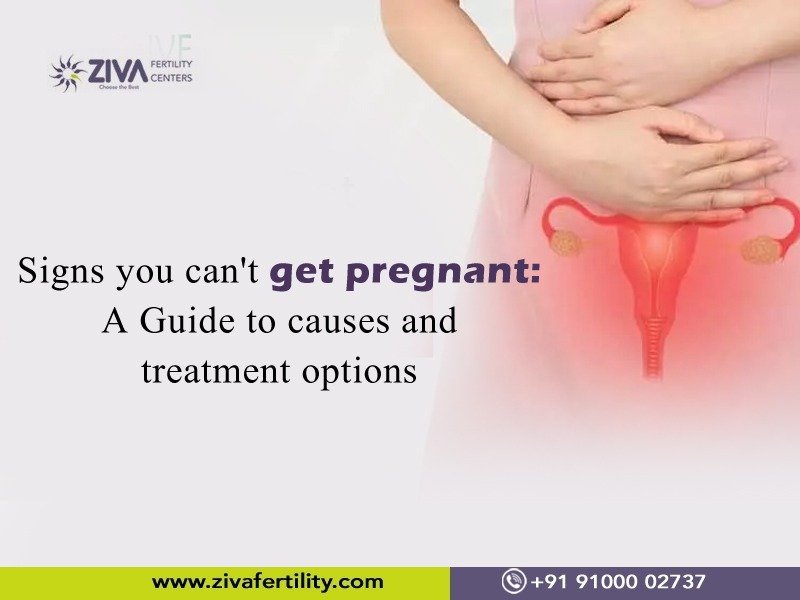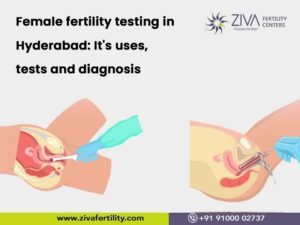Couples eager to start a family want to conceive at the earliest. Everyone begins with a positive mindset, but once they don’t see any result, they begin to doubt their fertility. One starts to browse the internet, looking for answers. Most couples look for solutions such as what are the signs that they can’t get pregnant? They want to know if the problem is medical, emotional, lifestyle-based, or genetic. Take a few minutes to learn what to look for as signs of infertility, causes, and treatment options.
Infertility is termed as a condition where the couple cannot get pregnant by having unprotected, regular sex for six months if the woman’s age is above 35 and for one year if the female’s age is below 35.
It is important to remember that infertility and sterility are not the same. Sterile means they can never have a child by biological means. If the couple is infertile, they can get help and can eventually have a child, either on their own or with medical assistance. Infertility is just not a woman’s only issue. In fact, in 30% of infertility cases, the problem is with male factor infertility. In 15% of infertility, there is no cause found despite all the tests, which is called unexplained infertility. Not all infertile cases lead to symptoms apart from not getting pregnant. Some may or may not notice any other signs.
Whether one exhibits symptoms or not depends on what is causing the infertility. If there are specific medical conditions, then there might be symptoms. In case of unexplained infertility, no signs can be found.
Signs that a woman cannot get pregnant

If women are experiencing changes in the menstrual cycle or ovulation cycles, it is a symptom related to infertility. So women can watch out for:
Abnormal periods: Excess or light bleeding
Irregular periods: The dates keep changing, and the gap between successive periods differs monthly.
No periods: Periods never started, or they have stopped abruptly.
Painful periods: The duration of the periods is very painful, with stomach cramps, back pain and pelvic pain.
If there are hormonal abnormalities in women, below are the changes observed:-
- Prone to acne and the skin pigmentation changes
- Changes in sexual desire and drive
- Dark hair starts to appear on the upper lip, chest, and chin
- Severe to moderate hair loss
- Weight fluctuations are mainly gaining weight, but some women might start losing weight, too.
- Even when not breastfeeding, milky white discharge from nipples
- Women experience pain during sex
Causes for Fertility Problems in Women
- Polycystic ovary syndrome – PCOS – This is a condition which is one of the main reasons for infertility in women. Women will face issues with ovulation, which means your ovary doesn’t release an egg. The hormone system behaves abnormally, due to which there are higher levels of testosterone present, which obstructs the ovulation process.
- Issues with fallopian tubes- during ovulation, the egg travels via the fallopian tubes, waiting for the sperm to fertilise. But due to scarring, infections, or adhesions, if there are blockages in the tubes, then pregnancy becomes an issue.
- Excess consumption of alcohol and smoking can lead to fertility problems in women.
- Weight issues such as being overweight or underweight can affect fertility.
- Thyroid problems.
- Diabetes.
- Age is a crucial factor in women, mostly. As age advances, the quality and quantity of eggs reduces, and getting naturally pregnant after age 45 is rare.
Signs of Infertility in Men

Men have far fewer outright symptoms than women if there is any infertility. Unless the man cannot father a child naturally, they usually do not see many visible signs, and if there are any symptoms, they can be vague.
Enhance your life with the power of pink topaz jewelry! Discover the perfect feng shui product to elevate your surroundings and energy. Embrace positivity and style with our exquisite collection. Join our community of mindful individuals and experience the transformative effects of pink topaz. Elevate your life today!
But a few symptoms that men could pay attention to are:
- Abnormal hair growth
- Reduced sexual desire or sex drive
- Pain, lump, or swelling in the testicles
- Problems with erections and ejaculation
- Small, firm testicles
Causes for Fertility Problems in Men
Almost all causes for fertility issues in men are sperm-related, barring a few congenital issues.
- Low sperm count
- Slow motility of the sperm means the sperm does not move as well as it should.
- Irregularly shaped sperm is known as an issue with sperm morphology.
- The sperm ducts are blocked, so the semen cannot flow out during ejaculation.
- There is a temporary reduction in the amount of sperm produced due to testicular injury.
- Testicles are too hot for too long, or they are in contact with chemicals.
- If men take drugs, it affects the way men make sperm.
- Excess alcohol or smoking can make the sperm count go down.
- Though men’s age does not affect their fertility as it does with women, men over the age of 40 do experience lower fertility.
What next after you notice signs that you can’t get pregnant?
If the female partner is under 35 and has been trying to get pregnant without success for a year, see a doctor. However, women older than 35 should see their doctor after 6 months of trying.
Blood, urine, and imaging tests are usually done for the female partner. Most of these tests should give the medical reason for not getting pregnant. In men, a sperm analysis is done to check for sperm count, sperm motility(speed of travel), and sperm morphology(sperm shape). Tests are done to check the overall health of the sperm.
Before you visit specialist fertility clinics like ZIVA, write down the following information and take it with you:-
- All the medications that you are currently taking or have taken in the recent past. This list should include prescriptions, vitamins, minerals, supplements, and other drugs bought without a prescription.
- Your sexual habits, like frequency and how long you have been trying, and the date of the last time you tried to get pregnant
- Any of the above-mentioned symptoms in either of the partners
- Any surgeries or treatments in the past, especially those involving the reproductive tract.
- Did you undergo any radiation or chemotherapy?
- Your habits of smoking, drinking and drug usage, if any.
- Any sexually transmitted diseases (STDs)
- Any genetic disorder running on either side of the family.
- Chronic illness in either of the partners, such as diabetes or thyroid disease.
Treatment Options after you find out signs that you can’t get pregnant
Based on the diagnosis, the treatment varies. The treatment options range from medication surgery to ART (Assisted Reproductive Treatment). We at ZIVA Fertility Clinics will decide on the treatment options based on what suits you best.
Medications: Medications can help regulate chronic conditions like thyroid, diabetes and hormonal problems. Ovulation-stimulating medications can also help in stimulating fertilisation. In men, medications can help with testosterone issues.
Surgery: Surgery is good if there are blocked fallopian tubes and anatomical issues with the reproductive system. In men, surgery can help with the reversal of vasectomy or varicocele.
ART: Various ARTs such as IUI, IVF, and I
CSI are there to get pregnant. The couple can use donor sperm, or donor eggs can also be used.We at ZIVA Fertility Clinics do a thorough diagnosis on both partners. We also offer counselling services to relieve any emotional or stressful situations. Please visit our website https://zivafertility.com/ or contact us at +91-9100002737, +91-9392834024, info@zivafertility.com
















